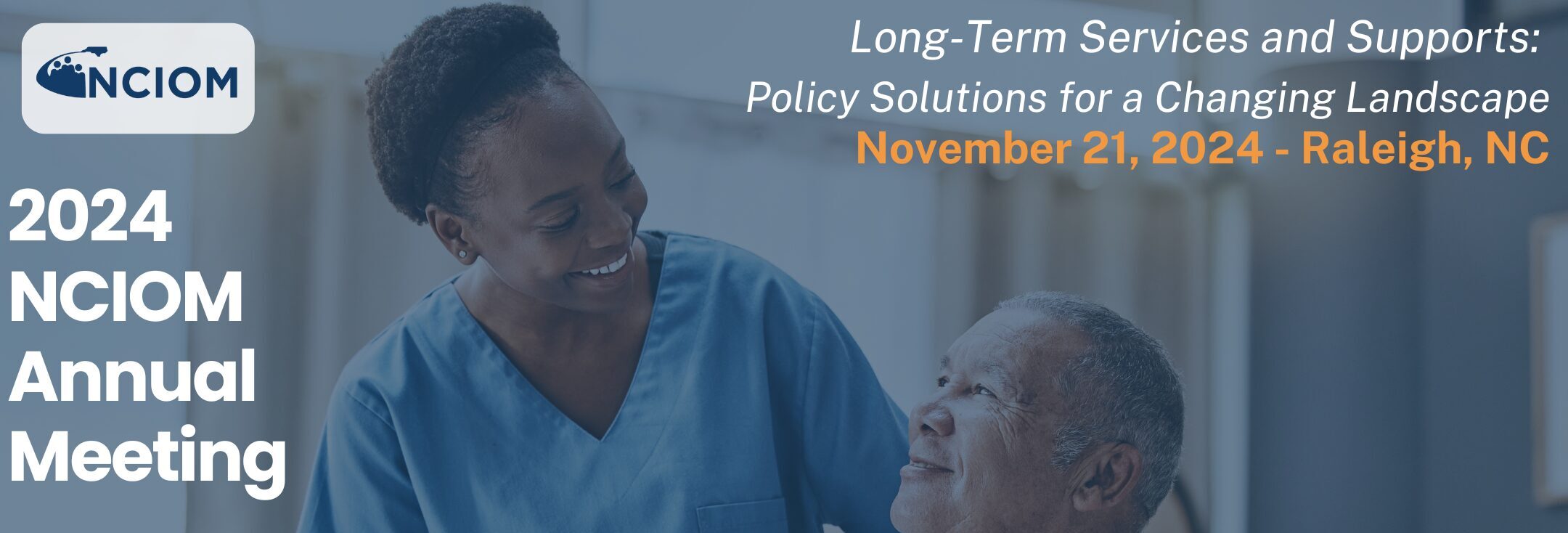


As our state’s demographic landscape shifts and the demand for long-term services and supports (LTSS) grows, the need for innovative, forward-thinking policy solutions has never been greater.
NCIOM’s 41st annual meeting provided a deep dive into some of the most pressing challenges and opportunities in long-term services and supports. Expert panels and thought-provoking discussions covered innovations in payment and care delivery and topics including:
Robert Espinoza, MPA
CEO of the National Skills Coalition and Board Chair of the American Society on Aging
Amanda Biggs
Specialist, Project C.A.R.E. (“Caregiver Alternatives to Running on Empty”), Mid-East Commission Area Agency on Aging
Paul L. Delamater, PhD
Faculty Fellow, Sheps Center for Health Services Research and Associate Professor of Geography, UNC Chapel Hill
Lee Dobson, MPA, CPHQ
Deputy Executive Director, BAYADA Hearts for Home Care
Corye Dunn, JD
Director of Public Policy, Disability Rights NC
Trish Farnham, JD, MPA
Coordinator of Essential Jobs, Essential Care-NC, NC Coalition on Aging
Ted Goins, BA
President and CEO, Lutheran Services Carolinas
Steve Freedman
Caregiver and Former Service Operations Section Chief, NC Division of Aging
Julie Ghurtskaia, RN, MPA
Vice President, Population Health, Carolina Complete Health
Tracy Hayes, JD, CHC
Area Director and Chief Executive Officer, Vaya Health
Mark Hensley, MA
Associate State Director, AARP NC
Jenny Hobbs, BS
Board Chair, Advocates for Medically Fragile Kids NC
Courtney Van Houtven, PhD
Professor, The Department of Population Health Science, Duke University School of Medicine and Duke-Margolis Institute for Health Policy
Erin Kent, PhD, MS
Associate Professor and Associate Chair for Research in Health Policy and Management, Gillings School of Global Public Health, UNC Chapel Hill
Bill E. Lamb, MSW, MPA
Executive Committee Member, Friends of Residents in Long Term Care
Sabrena Lea, BS
Deputy Director, NC Medicaid and LTSS, Division of Health Benefits, NC Department of Health and Human Services
Denise Lugo, CNA
Home Health Aide, Progressive Home Health Care
Andy MacCracken, MPA
Director, NC Center on the Workforce for Health, NC AHEC
Julian Montoro-Rodriguez, PhD
Professor of Sociology and Gerontology, School of Social Work, UNC Charlotte
Shannon Pointer, DNP, RN, CHPN
Senior Vice President of Hospice and Home Health Services and Professional Development Director, Association for Home & Hospice Care of North Carolina (AHHC)
Ursula Robinson, MSW
Executive Director and Program Director, Program of All-inclusive Care for the Elderly (PACE) of the Triad
Alicia Stokes, MHA
Vice President, Strategy, Planning & Performance, Government Markets, Blue Cross NC
NCIOM's 2023 annual meeting highlighted the factors that influence the health and well-being of our state’s children, from social drivers of health to protective supports at the family, individual, and community levels.
NCIOM's 2022 annual meeting focused on the challenges of recruitment, retention, and support for North Carolina’s workforce for health.
The NCIOM's 2021 Annual Meeting explored the behavioral health goals identified by the Healthy NC 2030 initiative. The meeting featured expert speakers on topics including substance use and overdose, access to behavioral health services, suicide prevention, and adverse childhood experiences.
The NCIOM's 2020 Annual Meeting explored research on the long-term potential impacts of foregone care due to COVID-19 on population health and the health system. Panelists and speakers discussed the factors that drove these impacts, such as changes in insurance coverage, capacity of the health system, changes to models of care and payment models, and drivers of health.
The NCIOM's 2019 Annual Meeting discussed Medicaid transformation in North Carolina. Discussion topics included the Healthy Opportunities Pilots, the NCCARE360 resource platform, navigating the transition, monitoring, oversight, evaluation, and special populations, as well presentations by representatives from each of the Medicaid Prepaid Health Plans.
The NCIOM's 2018 Annual Meeting explored how practices and systems across the state are evolving from coordinated care to team-based care models. While coordinated care has been widely embraced and implemented across North Carolina, true team-based care is still an elusive target for many health systems and providers. Team-based care has the potential to improve efficiency, effectiveness, value, outcomes, and patient and provider satisfaction. However, profound changes in culture and organization of care, education and training, financing, the fundamental nature of interactions.
The NCIOM's 2017 Annual Meeting focused on how community organizations, health systems, insurers, and others can share responsibility for the health of our communities using an accountable care communities model. Accountable care communities address health from a community perspective, pulling multiple stakeholders together in a coalition that shares responsibility for addressing multiple determinants of health. Accountable care communities use collaborative and integrated strategies to promote health, prevent disease, and ensure access to quality services.